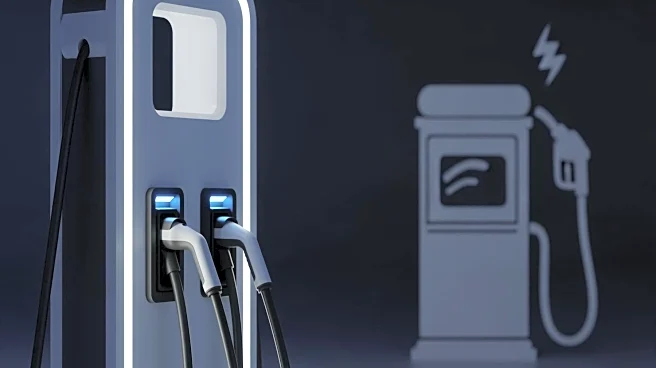What's Happening?
A detailed analysis has been conducted to compare the costs of charging electric vehicles (EVs) versus fueling gasoline-powered cars in the United States. The study, which utilized data from various government
sources and industry experts, found that charging an EV is generally cheaper than fueling a gas-powered vehicle. The average cost of electricity in the U.S. is approximately 17.5 cents per kilowatt hour, while the average price of gasoline is $3.18 per gallon. Based on these figures, the monthly cost of driving 1,250 miles is estimated at $73 for an EV and $159 for a gasoline car. This analysis highlights the potential savings for EV owners, especially in states with high gasoline prices like California.
Why It's Important?
The findings are significant as they provide a clearer understanding of the economic benefits of transitioning to electric vehicles. With gasoline prices being volatile and often high, EVs offer a more stable and potentially cheaper alternative for consumers. This could influence purchasing decisions, encouraging more Americans to consider EVs as a viable option. The reduced cost of operation for EVs also supports environmental goals by promoting cleaner energy usage. As the U.S. continues to push for greener policies, the economic advantages of EVs could play a crucial role in accelerating their adoption.
What's Next?
As the market for electric vehicles grows, further developments in charging infrastructure and technology are expected. Companies may invest in expanding public charging stations, making EV ownership more convenient. Additionally, potential government incentives could further reduce the cost of EV ownership, encouraging more consumers to make the switch. The ongoing advancements in battery technology may also lead to more efficient and cost-effective EVs, enhancing their appeal to a broader audience.
Beyond the Headlines
The shift towards electric vehicles could have broader implications beyond cost savings. It may lead to changes in the automotive industry, affecting jobs and manufacturing processes. The increased demand for electricity could also impact energy policies and infrastructure development. Moreover, the cultural shift towards sustainable transportation could influence societal attitudes towards environmental responsibility.











